Acclaimed playwright and director Koh Sun-woong swings between plays, musicals, and operas with his bold, individual style. Admired by critics and audiences alike, he has gained prestige and achieved box office success. We met him at Theater YONG, at the National Museum of Korea, in Seoul.
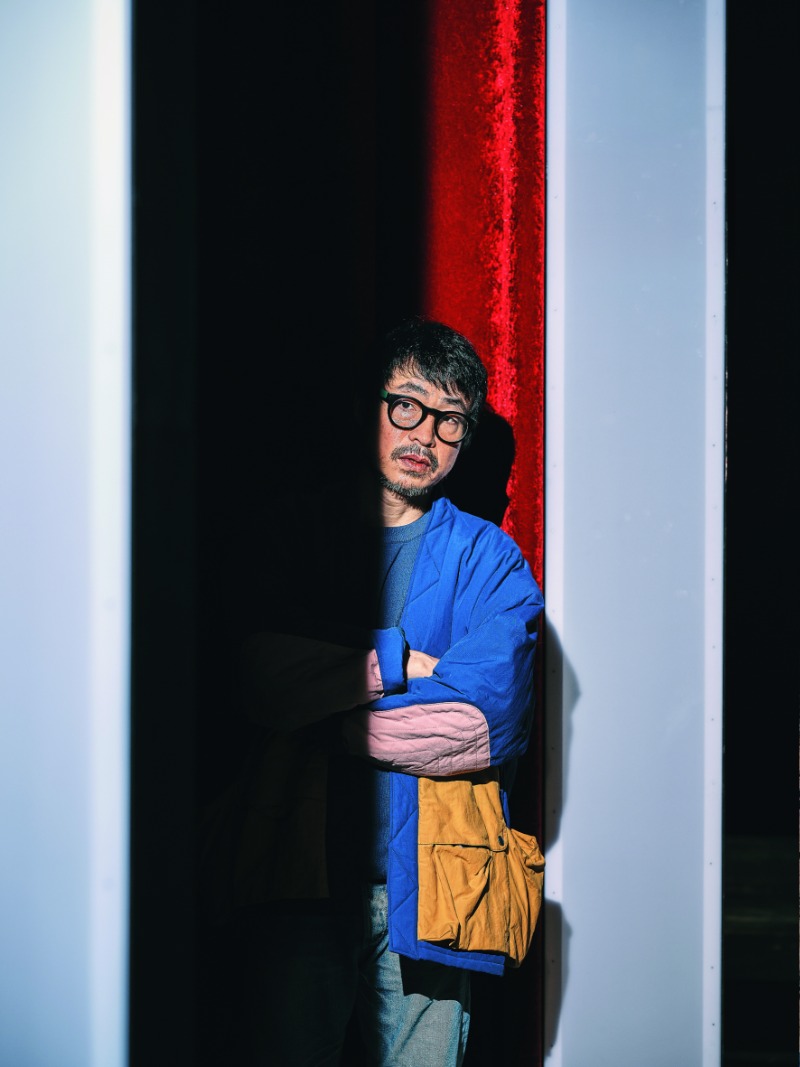
Koh Sun-woong, often called “the blue chip of the theater world,” has swept up numerous writing and directing awards. He works in various genres, from plays to musicals, operas, and changgeuk (traditional Korean opera). Recently appointed as Director of the Seoul Metropolitan Theater Company, he aims to keep presenting original plays about contemporary lives.
Koh Sun-woong defines the work of a director as “taking text that’s lying flat on the floor and standing it up straight.” For Koh, the whole process – from starting with a blank page to staging a story that provokes emotions and brings joy – is about fun. Indeed, “fun” is the cornerstone of all of his projects. But having fun is not only about getting laughs; it is about giving people something to think about. Koh sees a comedic device simply as part of the process that takes us deeper and closer to the tragic.
Koh’s relationship with the theater first began at a university club. In 1999, he entered the Hankook Ilbo literary contest and won in the play category with his original work, “The Woman in a Sad Landscape.” In the years since, he has written and adapted many plays and garnered wide praise, reaping countless playwriting and directing awards and earning a reputation for having the Midas touch.
Koh also served as the creative director of the opening and closing ceremonies for the PyeongChang 2018 Winter Paralympic Games; an original musical commemorating the 40th anniversary of the May 18 Democratization Movement, titled “City of Light”; and an opera about victims of Japanese military sexual slavery, titled “1945.”
Koh’s most recent work was a jukebox musical called “The Love of a Million Roses.” His brilliant use of popular hit songs through the ages to unpack 100 years of modern and contemporary Korean history made it the talk of the town.
Good intentions produce good work – this is Koh’s philosophy. His methods are a far cry from the stereotype of the charismatic dictator ruling the stage. Koh communicates clearly and smoothly, not just with his actors but with all his colleagues and collaborators. And last September, he was named the director of the Seoul Metropolitan Theatre, a three-year position.
What is most important as a director?
The most important thing is to meet the audience where they are, to create audience-oriented work. Of course, aesthetics and artistry are important, too. But no matter how good a work is, if the audience struggles with it and turns their backs, then what is the point? There’s no reason for such works to exist. I think a performance is only complete once an audience has seen it unfold. You need both artistry and entertainment value, which is no easy task. So, I spend a lot of time thinking and talking with the writer, actors, and crew.
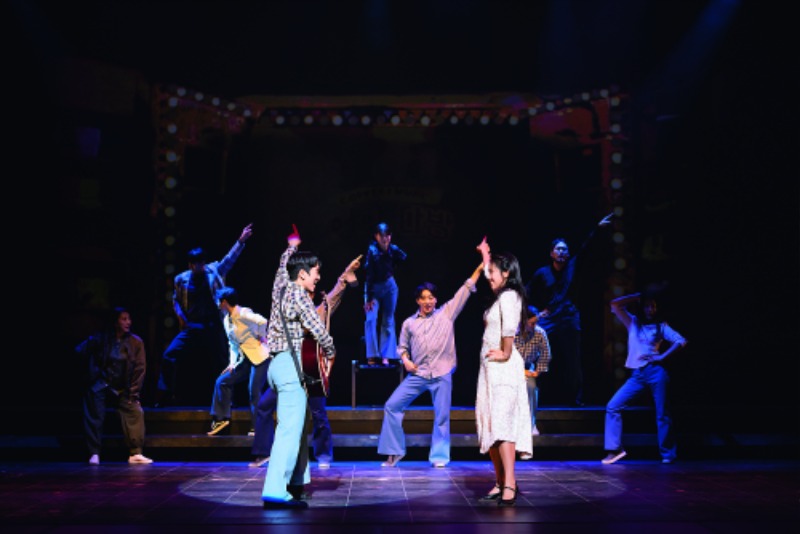
“The Love of a Million Roses” is a jukebox musical that premiered late 2021 at Uijeongbu Arts Center in Gyeonggi Province. Based on popular songs from the past century, it features symbolic scenes from modern and contemporary history.
ⓒ Playfactory Mabangzen
Why three plays based on Chinese classics?:
“The Orphan of Zhao: Seeds of Revenge,” “Camel Xiangzi” and “The Chalk Circle”
The stories are so good. These classics have a very simple, clear storyline. That kind of raw story fits the genre of the play quite well. In those old Chinese classics, you sometimes get stage directions like: “The dead character exits the stage.” But how can a dead person get up and leave? Still, we follow the directions. We stay true to the form of the play. A lot of these works also have themes and issues that fit perfectly with our current era, making us take stock of the present.
What about the second run of “The Love of a Million Roses”?
Major historical events are not just about great men and heroes – they were also lived by ordinary people. And there are popular songs from these eras about the love, separation, and pain these ordinary people experienced. If you listen to the mainstream hits of the past 100 years in order, you realize how our people have lived over the past century.
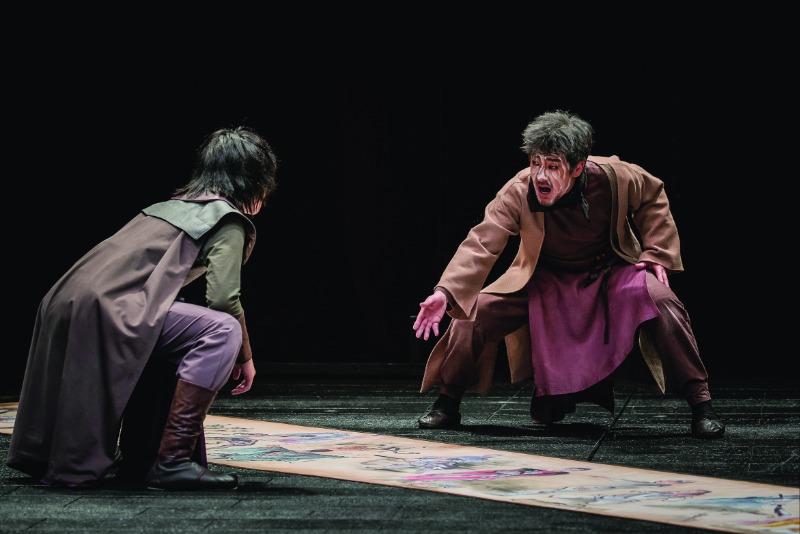
“The Orphan of Zhao: Seeds of Revenge” is an adaptation of the Chinese classical play “The Orphan of Zhao.” Reworked to reflect contemporary sensibilities, it premiered November 2015 at the Myeongdong Theater in Seoul and was widely acclaimed as the best play of the year. The following year, it was staged at the National Theatre of China in Beijing, where it received standing ovations.
ⓒ National Theater Company of Korea
What enables you to go back and forth between genres?
The genres may be different, but the essence is the same. In theater, you use gestures, and this is almost like dance. It’s the same with lines, too. The same lines you speak, once you take it to the company, become a song. Going back and forth between genres is really a lot of fun. It’s not that difficult. When I encounter s, I can tell which would make a good play or musical. As a director, it is much more enjoyable to experience different genres. And there is such a thing as fate. There are some pieces that just don’t work out.
What will be your focus at the Seoul Metropolitan Theatre?
Mainstream appeal and entertainment value are both important factors. Inasmuch as we are a public theater company, I think it’s good for us to deal with universal stories that the majority of audiences can relate to and understand. At the same time, we have to present works that are well-made. In other words, we need a high-quality aesthetic. I’m a bit greedy, you see.
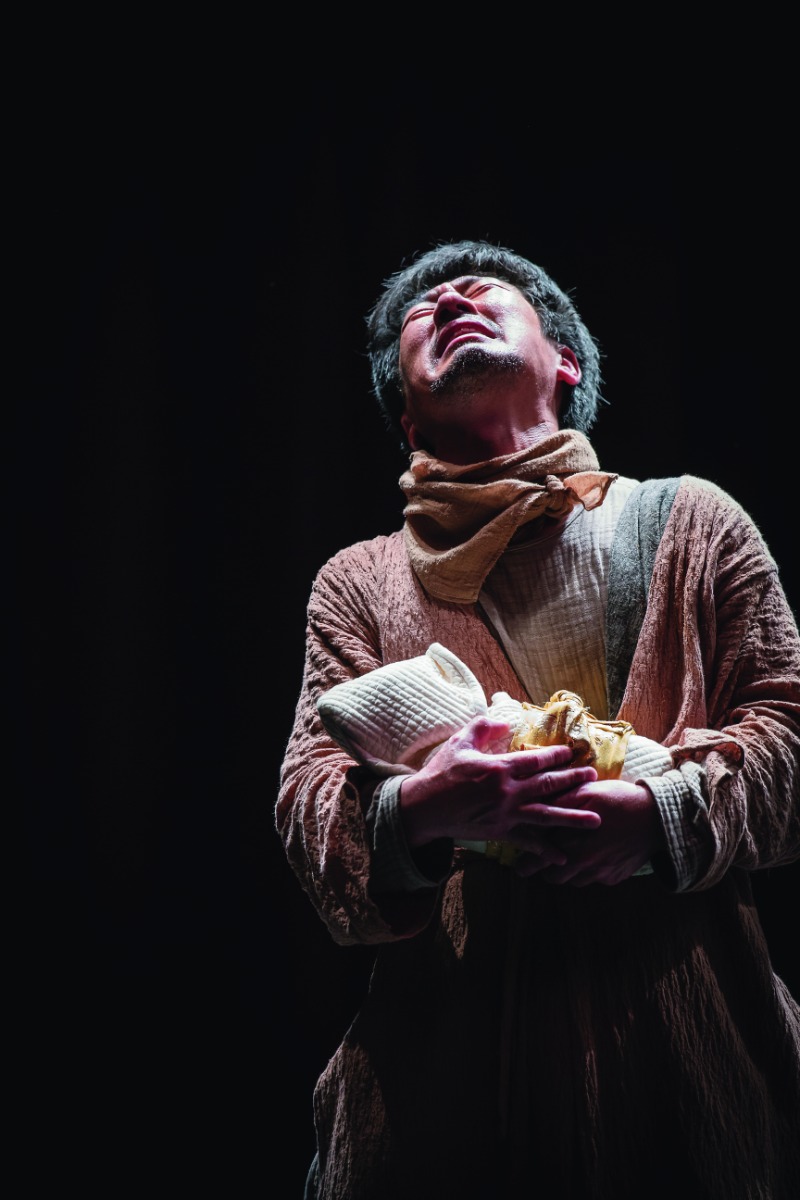
“The Orphan of Zhao: Seeds of Revenge” tells the story of the last surviving member of the Zhao family, who were unjustly destroyed. Selected as the performance of the National Theater Company of Korea audiences most wanted to see, it returned to Myeongdong Theater April 2021 in response to popular demand.
ⓒ National Theater Company of Korea
What kind of works do you have in mind, and how many?
To start with, I’m going to put on a compelling Western classic. I’m considering works from the 19th and early 20th century. Meanwhile, we’ll take time to prepare and get some original new work up around the year after the next. It’s the Seoul Metropolitan Theatre, so my guess is that the story will be about Seoul. And this will likely involve me hiring a writer, or holding a contest to find a new writer, rather than writing the myself. During my three-year term, I plan to focus completely on the theater. I would like to produce around five plays per year. That’s not a small number. I have plans to re-stage some old favorites from the past, too.
Where do you get your ideas, as a director?
Back in 2002, the painter Park Bang-young, an artist I deeply admire, gave me a piece titled “If You Love, You Will Come to Know.” At first, I didn’t understand what that meant, but after three years, it dawned on me. And after that my life began to change. It’s not that you have to know something in order to love it; you have to love it to know it. We are mistaken to think that we must accept something first to be able to love it. When you love, you don’t actually need acceptance or understanding – and in work, that means everything speeds up, and you have fewer conflicts. To me, a lack of ideas indicates a dearth of love. If you can just love the work in question more, then strangely, the ideas start to come. I have tried to apply this principle across the board, and along the way, I noticed my relationships with actors and crews have improved, too. Every time I work on a project, I think about those words, and it’s helped me do my work with more ease, without nearly as much strain.
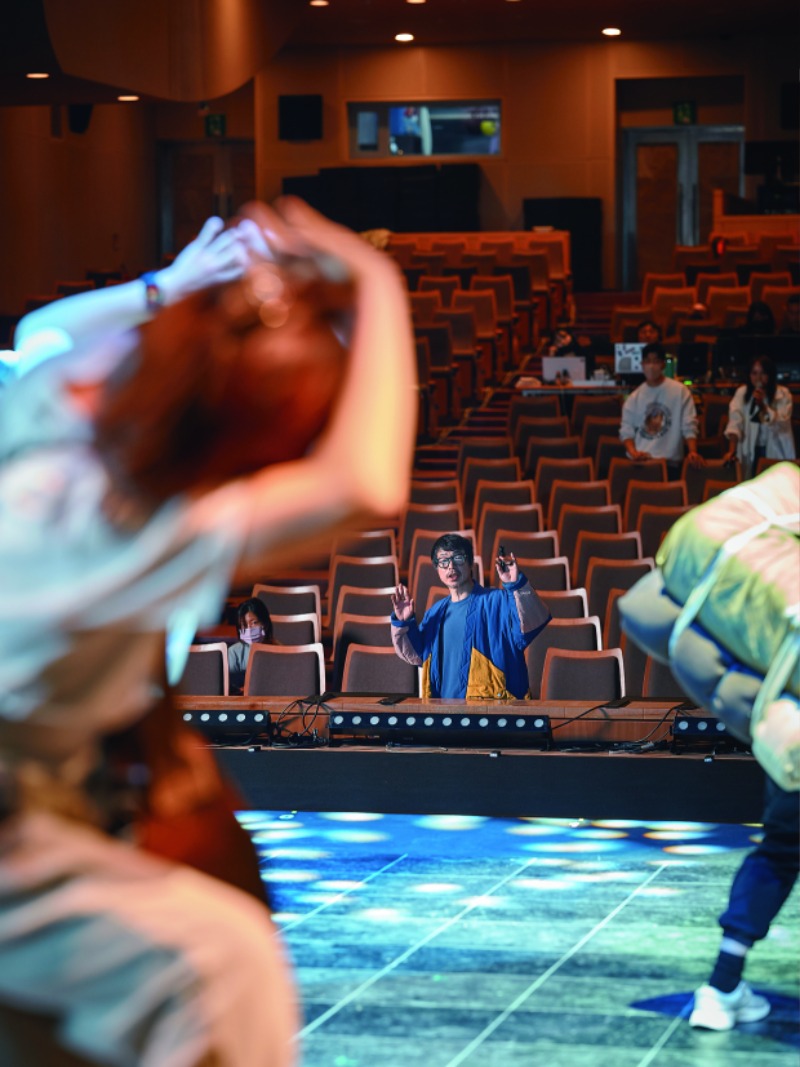
Director Koh Sun-woong gives directions at last-minute rehearsals leading to the October 2022 return of the musical “The Love of a Million Roses.” Koh is known for his ability to inject wit in a heavy narrative.
Is “love” important to understanding your plays?
All my plays come from that process. They are all works that stem from love. When you study a work as you direct it, there is no end to the undertaking. But because I truly love the work in question, I don’t actually need to study it for very long. I love it, so I already know it. There is nothing complicated about it. Of course, this is easy to forget, so sometimes I get stressed, and sometimes I get angry. Still, I remind myself of this, over and over, and that helps me to pull back and stay calm.
Isn’t theater getting pushed aside more and more?
That may be, but the fact remains that theater is a great thing. Theater must continue. The more technology advances, the more people will become like cogs in a machine, growing lonelier all the time. And that means theater, with its ability to make audiences laugh and cry in real time, will be more vital than ever. We need theater to continue speaking to the dignity of humankind.
Do you ever think about trying a new genre?
I’d like to make a movie someday. Theater and film are a bit different. With a play, you breathe and age together with the audience, day after day; with a movie, you have to do it well in one go. Movies should feel natural, whereas in theater, you need to go beyond the natural. To make a movie, you need to write a screenplay first. Movies, too, only get made when things fall into place. I haven’t written a screenplay yet, but I do plan to start.
Lim Suk-kyoo Reporter, The Hankyoreh
Heo Dong-wuk Photographer